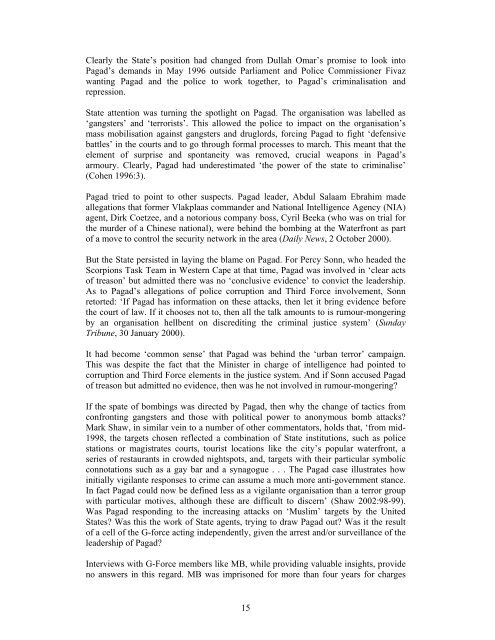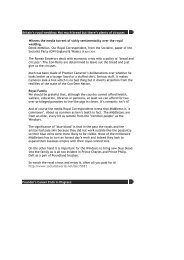The Cape of Good Dope? - Centre for Civil Society - University of ...
The Cape of Good Dope? - Centre for Civil Society - University of ...
The Cape of Good Dope? - Centre for Civil Society - University of ...
You also want an ePaper? Increase the reach of your titles
YUMPU automatically turns print PDFs into web optimized ePapers that Google loves.
Clearly the State’s position had changed from Dullah Omar’s promise to look into<br />
Pagad’s demands in May 1996 outside Parliament and Police Commissioner Fivaz<br />
wanting Pagad and the police to work together, to Pagad’s criminalisation and<br />
repression.<br />
State attention was turning the spotlight on Pagad. <strong>The</strong> organisation was labelled as<br />
‘gangsters’ and ‘terrorists’. This allowed the police to impact on the organisation’s<br />
mass mobilisation against gangsters and druglords, <strong>for</strong>cing Pagad to fight ‘defensive<br />
battles’ in the courts and to go through <strong>for</strong>mal processes to march. This meant that the<br />
element <strong>of</strong> surprise and spontaneity was removed, crucial weapons in Pagad’s<br />
armoury. Clearly, Pagad had underestimated ‘the power <strong>of</strong> the state to criminalise’<br />
(Cohen 1996:3).<br />
Pagad tried to point to other suspects. Pagad leader, Abdul Salaam Ebrahim made<br />
allegations that <strong>for</strong>mer Vlakplaas commander and National Intelligence Agency (NIA)<br />
agent, Dirk Coetzee, and a notorious company boss, Cyril Beeka (who was on trial <strong>for</strong><br />
the murder <strong>of</strong> a Chinese national), were behind the bombing at the Waterfront as part<br />
<strong>of</strong> a move to control the security network in the area (Daily News, 2 October 2000).<br />
But the State persisted in laying the blame on Pagad. For Percy Sonn, who headed the<br />
Scorpions Task Team in Western <strong>Cape</strong> at that time, Pagad was involved in ‘clear acts<br />
<strong>of</strong> treason’ but admitted there was no ‘conclusive evidence’ to convict the leadership.<br />
As to Pagad’s allegations <strong>of</strong> police corruption and Third Force involvement, Sonn<br />
retorted: ‘If Pagad has in<strong>for</strong>mation on these attacks, then let it bring evidence be<strong>for</strong>e<br />
the court <strong>of</strong> law. If it chooses not to, then all the talk amounts to is rumour-mongering<br />
by an organisation hellbent on discrediting the criminal justice system’ (Sunday<br />
Tribune, 30 January 2000).<br />
It had become ‘common sense’ that Pagad was behind the ‘urban terror’ campaign.<br />
This was despite the fact that the Minister in charge <strong>of</strong> intelligence had pointed to<br />
corruption and Third Force elements in the justice system. And if Sonn accused Pagad<br />
<strong>of</strong> treason but admitted no evidence, then was he not involved in rumour-mongering?<br />
If the spate <strong>of</strong> bombings was directed by Pagad, then why the change <strong>of</strong> tactics from<br />
confronting gangsters and those with political power to anonymous bomb attacks?<br />
Mark Shaw, in similar vein to a number <strong>of</strong> other commentators, holds that, ‘from mid-<br />
1998, the targets chosen reflected a combination <strong>of</strong> State institutions, such as police<br />
stations or magistrates courts, tourist locations like the city’s popular waterfront, a<br />
series <strong>of</strong> restaurants in crowded nightspots, and, targets with their particular symbolic<br />
connotations such as a gay bar and a synagogue . . . <strong>The</strong> Pagad case illustrates how<br />
initially vigilante responses to crime can assume a much more anti-government stance.<br />
In fact Pagad could now be defined less as a vigilante organisation than a terror group<br />
with particular motives, although these are difficult to discern’ (Shaw 2002:98-99).<br />
Was Pagad responding to the increasing attacks on ‘Muslim’ targets by the United<br />
States? Was this the work <strong>of</strong> State agents, trying to draw Pagad out? Was it the result<br />
<strong>of</strong> a cell <strong>of</strong> the G-<strong>for</strong>ce acting independently, given the arrest and/or surveillance <strong>of</strong> the<br />
leadership <strong>of</strong> Pagad?<br />
Interviews with G-Force members like MB, while providing valuable insights, provide<br />
no answers in this regard. MB was imprisoned <strong>for</strong> more than four years <strong>for</strong> charges<br />
15
















